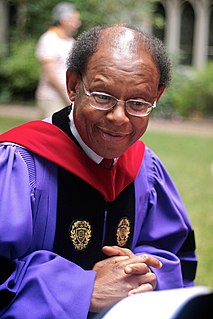A Quote by Dwight L. Moody
The world does not understand theology or dogma, but it understands love and sympathy.
Quote Topics
Related Quotes
A building is akin to dogma; it is insolent, like dogma. Whether or no it is permanent, it claims permanence, like a dogma. People ask why we have no typical architecture of the modern world, like impressionism in painting. Surely it is obviously because we have not enough dogmas; we cannot bear to see anything in the sky that is solid and enduring, anything in the sky that does not change like the clouds of the sky.
Whoever, therefore, thinks that he understands the divine scriptures or any part of them so that it does not build on the double love of God and of our neighbor does not understand it at all. Thus a man supported by faith, hope, and charity, with an unshaken hold upon them does not need the scriptures. . . And many live by these three things in solitude without books.
Systematic theology will ask questions like "What are the attributes of God? What is sin? What does the cross achieve?" Biblical theology tends to ask questions such as "What is the theology of the prophecy of Isaiah? What do we learn from John's Gospel? How does the theme of the temple work itself out across the entire Bible?" Both approaches are legitimate; both are important. They are mutually complementary.
The Resurrection of Jesus is...a symbol of hope...I don't see how you can show love...without being in solidarity with the victims of this world. And if you are in solidarity with the victims, I don't see how you can avoid the cross. The theology of the cross is the theology of love in our real world.




































